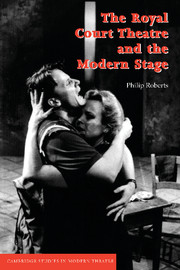Book contents
- Frontmatter
- Contents
- Foreword by Max Stafford-Clark
- Preface
- Acknowledgements
- List of abbreviations
- Biographical notes
- Introduction: abortive schemes, 1951–1954
- 1 Coincidences, 1954–1956
- 2 The struggle for control, 1956–1960
- 3 Conflict and competition, 1961–1965
- 4 A socialist theatre, 1965–1969
- 5 A humanist theatre, 1969–1975
- 6 Changing places, 1975–1979
- 7 Theatre in a cold climate, 1980–1986
- 8 Holding on, 1987–1993
- Afterword
- Notes
- Select bibliography
- Index
Afterword
Published online by Cambridge University Press: 22 September 2009
- Frontmatter
- Contents
- Foreword by Max Stafford-Clark
- Preface
- Acknowledgements
- List of abbreviations
- Biographical notes
- Introduction: abortive schemes, 1951–1954
- 1 Coincidences, 1954–1956
- 2 The struggle for control, 1956–1960
- 3 Conflict and competition, 1961–1965
- 4 A socialist theatre, 1965–1969
- 5 A humanist theatre, 1969–1975
- 6 Changing places, 1975–1979
- 7 Theatre in a cold climate, 1980–1986
- 8 Holding on, 1987–1993
- Afterword
- Notes
- Select bibliography
- Index
Summary
This crumbling ramshackle building has the status of a myth. It holds the fingerprints of the greatest writers and actors of our age. One said to me that if you squeeze the bricks, blood would come out.
(Stephen Daldry, ‘Omnibus: Royal Court diaries’, BBC1, 25 October 1996)Daldry viewed his partnership with Stafford-Clark as a fertile one: ‘it combined the two different areas of taste that were working together. And Max educated me in lots of ways … the age gap was a huge advantage because Max could take me on as a pupil in a sense’. Stafford-Clark's view was that in ‘the eighteen months we worked together, not only, contrary to all predictions, did we not quarrel but we made a very firm friendship … And, at the end of it, there was a £300,000 surplus’. Daldry's policy as Artistic Director, however, consciously diverged from Stafford-Clark's. He took as a model his reading of Devine's methods of running a theatre:
I changed the organisation of the theatre away from Max towards what I thought George had done. George had run it with his Associates … to make sure there was never any single dominance of taste. George got himself surrounded by people who had often contradictory tastes to his own, but whom he trusted. Max had run it much more singularly. He would play to the extent of his own taste but what he tended to do … was to get people to work within his own parameters of taste. What I thought I'd do was set up a series of satellites who actually had much more freedom not just in producing but also commissioning.
- Type
- Chapter
- Information
- The Royal Court Theatre and the Modern Stage , pp. 219 - 229Publisher: Cambridge University PressPrint publication year: 1999



